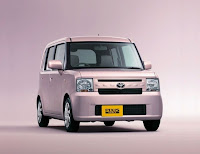
Toyota has Launches the new Pixis Space in Japan. Supplied by Daihatsu Motor Co., Ltd., the car is the result of a partnership the two automakers signed last year.
Minicars are defined under Japanese regulations as having maximum length of 3.4 meters, width of 1.48 meters, height of 2 meters and engine displacement of less than 660 cc.
Equipped with Toyota's eco-IDLE2 � a fuel-saving stop-start system � select versions of the Pixis Space return a class-leading fuel economy rating of 25.5 kilometers per liter (60 mpg U.S.) on Japan's generous 10-15 test cycle.
Minivehicles, with engine displacements of up to 660cc, are unique to Japan and made up about 35 per cent of total vehicle sales last year. They are especially popular in rural areas as a second or third family car.
On the Japanese market, the Pixis Space is priced from JPY1.12 million ($14,700), though it can go all the way up to JPY1.611 million ($21,145).


Press Release
TMC Launches 'Pixis Space' Minivehicle in Japan
-Vehicle First of Minivehicles to be Supplied by Daihatsu on OEM Basis-
Toyota City, Japan, September 26, 2011-Toyota Motor Corporation (TMC) in Japan today launched the "Pixis1 Space", the first passenger minivehicle to be launched under the Toyota brand. The vehicle will be sold through more than 200 Toyota dealerships nationwide.
The Pixis Space has been designed to meet the diversifying needs of car-buyers in Japan. The vehicle features sophisticated square styling, employs functions and equipment suited to daily driving and has high environmental performance.
Coming in two distinct variations-the simply styled "L" and "X" models and the strong-presence "Custom X", "Custom G" and "Custom RS" models-the Pixis Space's unique design and eight available body colors create variety that enables buyers to better select a vehicle suiting their tastes. The vehicle's carefully crafted and color-accented front seats convey sophistication, contributing overall to its comfortable interior. Moreover, the adoption of the eco-IDLE2 system-a new idling-stop function-in the X and Custom G models, achieves class-leading3 fuel efficiency of 25.5 km/l in the 10-15 test cycle outlined by Japan's Ministry of Land, Infrastructure, Transport and Tourism (MLIT).
The Pixis Space represents the first vehicle supplied by Daihatsu Motor Co., Ltd. (Daihatsu) to TMC under a minivehicle OEM agreement reached in September 2010.
Vehicle Outline
Wide variety to match personal tastes
Two distinct style variations and eight available body colors allow selection that matches personal taste.
L and X
With a square form characterized by bold surfaces and excellent driving visibility, the L and X models also deliver an unassuming cabin space, with simple horizontal accents. A warm gray interior gives a welcoming, modern impression.
Custom X, Custom G, Custom RS
The vertical two-lamp, high-intensity discharge headlight configuration and front aerodynamic bumpers contribute to the imposing front view of the Custom grade models, while the side stone guards play into a side silhouette distinguished by a low center of gravity. The inside is characterized by black undertones and an illuminated instrument panel with switch-controlled graduated lighting, combining to deliver a cool, subdued interior.
Spacious cabin area ensures comfort for all occupants
A long, 2,490 mm wheelbase provides the Pixis Space with a 2,000 mm cabin length. Combined with ample height and a broad width, there is plenty of room for four adults while still ensuring sufficient luggage space.
Designed for everyday use, the vehicle features front seats reminiscent of a sofa that are the result of careful attention to fabric selection and fine needlework.
Superior environmental performance
All models adopt a continuously variable transmission (CVT) with both available engines, the 660 cc KF engine with Dynamic Variable Valve Timing (DVVT)4 and the 660 cc KF engine with an intercooler-equipped turbo, thus giving the vehicle a smooth ride and high fuel efficiency.
The front-wheel-drive X and Custom G models are equipped with eco-IDLE, a new idling-stop function, and get 25.5 km/l (equivalent to 91g/km of CO2 emissions) in the 10-15 test cycle outlined by Japan's Ministry of Land, Infrastructure, Transport and Tourism (MLIT).
All models (excluding the Custom RS) surpass the Japanese 2010 fuel efficiency standards5 by 25%. Combined with certification for emission levels 75% lower than 2005 standards under the MLIT approval system for low-emission vehicles, these models qualify for a 75% reduction in the Japanese automobile acquisition tax and automobile weight tax, in accordance with the Japanese government's taxation system for environment-friendly vehicles.








No comments:
Post a Comment